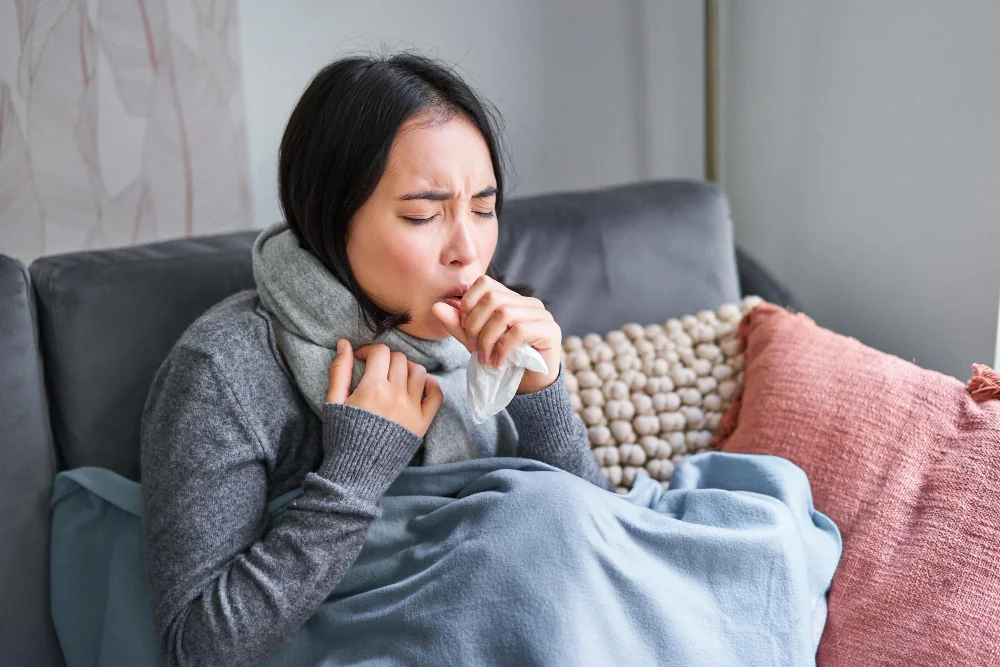If you’re struggling with a persistent cough that’s disrupting your sleep, you’re not alone. Coughing can be caused by a variety of factors, from allergies and colds to more serious conditions like asthma and bronchitis. There are also plenty of natural remedies you can try at home to help ease your symptoms and get some much-needed rest. In this article, we’ll explore some of the most effective home remedies to stop cough at Night (Nocturnal cough) and allow you to get a good night’s rest.
Why are coughs worse at night?
Coughs can often become worse at night due to several reasons. Here are some of the most common reasons why coughs are worse at night:
1. Postnasal drip
When you lie down, mucus can accumulate at the back of your throat, triggering a cough. This is especially true if you have allergies, a sinus infection, or a cold. (1)
2. Acid reflux
When you lie down, stomach acid can flow back into your esophagus and trigger a cough. This is especially true if you’ve eaten a large meal or consumed foods that are spicy, fatty, or acidic. (2)
3. Dry air
The air in your bedroom can be drier at night, which can irritate your airways and trigger a cough. (3)
4. Reduced cough reflex
During the day, you are more likely to cough to clear your airways, but at night, your cough reflex may be reduced, allowing mucus to build up and trigger a cough. (4)
5. Asthma
If you have asthma, your symptoms may be worse at night due to changes in your body’s natural rhythms, such as hormonal fluctuations and inflammation. This can cause wheezing, shortness of breath, and a cough. (5)
6. Bronchitis
Bronchitis is an inflammation of the bronchial tubes, which carry air to and from the lungs. Coughing is a common symptom of bronchitis, and it can be particularly bothersome at night. (6)
How to stop cough at night naturally: 12 Effective Home Remedies for a Restful Sleep
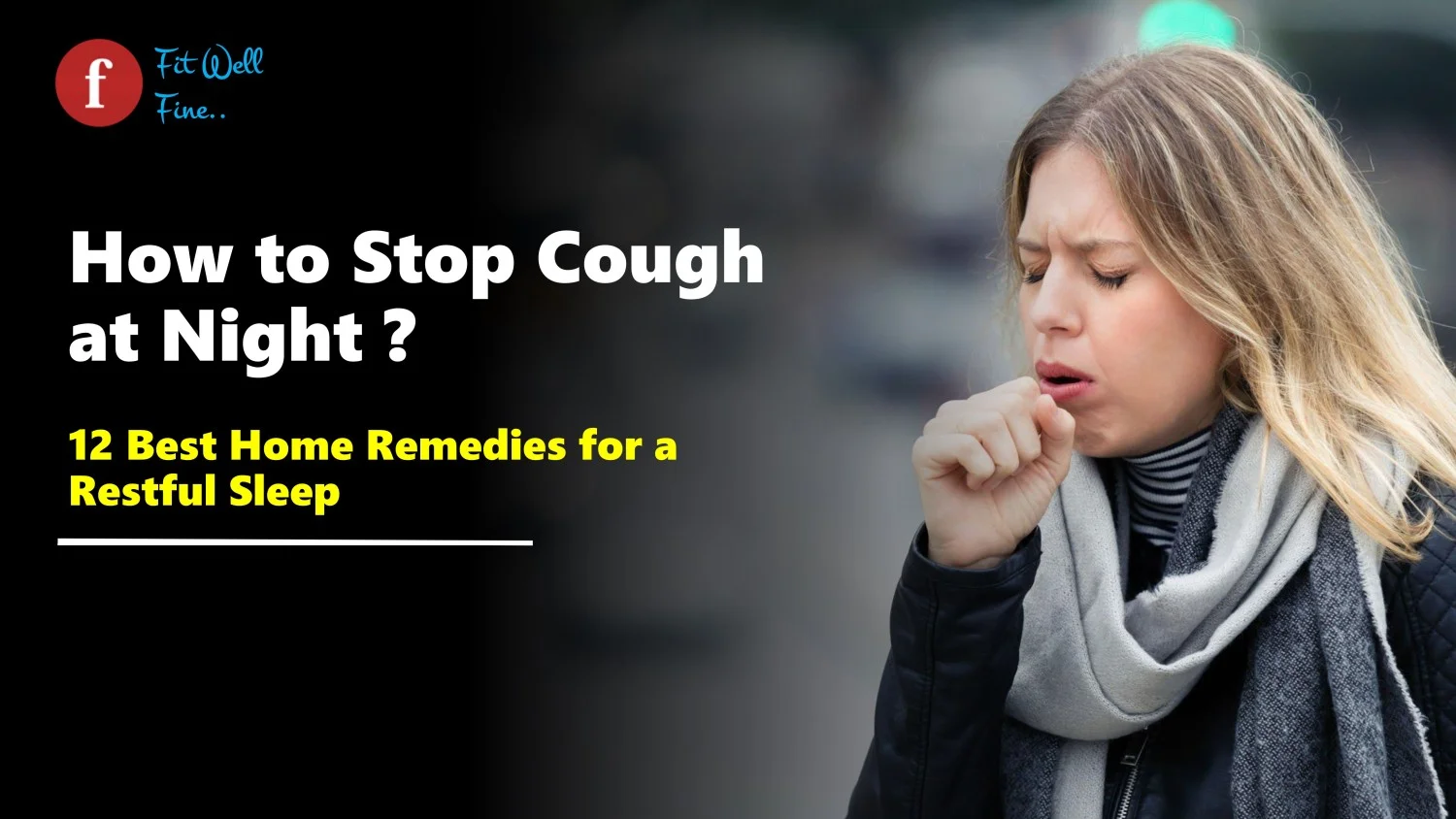
There are several home remedies that can be effective for relieving Nocturnal Cough (cough at night). However, it’s important to note that home remedies may not work for everyone, and they may not be effective for all types of cough.
Here are some effective natural remedies for common Nighttime Cough.
1. Honey and Lemon: A Classic Combo
Honey and lemon have been used as a natural cough remedy for centuries, and for good reason. Honey is known for its antibacterial properties, while lemon is packed with vitamin C and antioxidants. Together, they create a powerful remedy that can soothe your throat and suppress your cough. (7)
In one study, children ages 1 to 5 with upper respiratory tract infections were given up to 2 teaspoons (10 milliliters) of honey at bedtime. The honey seemed to reduce nighttime coughing and improve sleep.
How to use-
Here are some ways you can use honey and lemon as a home remedy for cough at night:
- Honey and Warm Water: Mix one tablespoon of honey into a glass of warm water and drink it before going to bed. The warm water can help soothe your throat while the honey works to relieve your cough.
- Honey and Lemon: Squeeze half a lemon into a glass of warm water, add one tablespoon of honey, and stir well. Drink this mixture before going to bed to help reduce your cough.
- Honey and Turmeric: Mix one teaspoon of turmeric powder and one tablespoon of honey together to create a paste. Eat this mixture before going to bed to help reduce your cough.
- Honey and Ginger: Grate a small piece of ginger and add it to a cup of warm water. Stir in one tablespoon of honey and drink it before going to bed to help reduce your cough.
Note: Remember that honey should not be given to children under the age of one year old due to the risk of infant botulism.
2. Ginger for cough relief
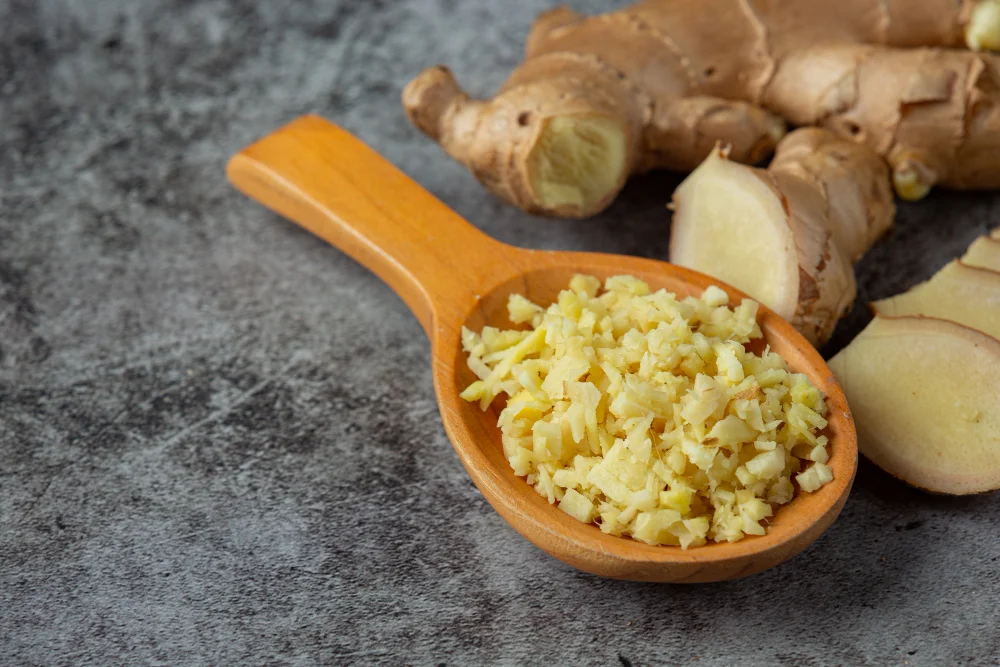
Ginger is a best cough remedies for bedtime. It has anti-inflammatory and antibacterial properties and can help soothe a cough. Try adding fresh ginger to hot water and drink as a tea before bed. (8)
Research shows that ginger may do this by blocking inflammatory proteins in the body. These proteins cause pain, itching, and burning in the throat due to inflammation.
How to use-
Here are some ways you can use ginger as a home remedy for cough at night:
- Ginger Tea for cough: Boil a few slices of fresh ginger in a cup of water for 10-15 minutes. Strain the tea and add honey or lemon to taste. Drink the tea before going to bed to help reduce your cough.
- Ginger and Honey for cough: Mix one tablespoon of fresh ginger juice with one tablespoon of honey. Eat this mixture before going to bed to help reduce your cough.
- Ginger and Turmeric for cough: Mix one teaspoon of ginger powder and one teaspoon of turmeric powder in a glass of warm water. Drink this mixture before going to bed to help reduce your cough.
- Ginger and Garlic for cough: Crush a few cloves of garlic and a small piece of ginger. Mix them together and add them to a cup of warm water. Drink this mixture before going to bed to help reduce your cough.
Note: Remember that ginger may interact with certain medications and should not be consumed in excessive amounts.
3. Steam good for dry cough
Inhaling steam can help loosen mucus in the airways and soothe a cough. Steam is a simple and effective natural remedy that can help relieve dry cough at night. It works by moistening the airways, making it easier to breathe and reducing coughing. (9)
Research shows that steam from hot water can help moisturize the dry and irritated tissues in your nasal passages and throat. It can also ease irritation in sore throats and reduce coughs.
How to use-
Here are some ways you can use steam as a home remedy for cough at night:
- Hot Shower: Take a hot shower before going to bed. The steam from the shower can help moisten the airways and reduce coughing.
- Steam Inhalation: Boil a pot of water and remove it from heat. Place a towel over your head and lean over the pot, keeping your face at a safe distance. Inhale the steam for 5-10 minutes. You can add essential oils like eucalyptus or peppermint to the water for added benefit.
- Humidifier: Use a humidifier in your bedroom to add moisture to the air. This can help reduce coughing and make it easier to breathe.
- Steamy Beverage: Drink a steamy beverage like hot tea or soup before going to bed. The steam from the beverage can help moisten the airways and reduce coughing.
Remember that steam can cause burns if not used safely, so be careful when handling hot water or steam.
4. Salt Water gargle for instant cough relief

Saltwater gargle is a simple and effective natural remedy that can help relieve cough at night. It works by reducing inflammation in the throat and loosening mucus, making it easier to cough up. (10)
Research found that gargling with salt water three times a day was effective in reducing the frequency of upper respiratory tract infections in healthy individuals.
How to use-
Here are some ways you can use saltwater gargle as a home remedy for cough at night:
- Saltwater Gargle: Add one teaspoon of salt to a cup of warm water and stir until the salt dissolves. Gargle the solution for 30 seconds, then spit it out. Repeat this process several times a day, especially before going to bed.
- Honey and Saltwater Gargle: Add one teaspoon of salt and one tablespoon of honey to a cup of warm water and stir until the salt and honey dissolve. Gargle the solution for 30 seconds, then spit it out. Repeat this process several times a day, especially before going to bed.
Note: Remember that saltwater gargle should not be given to children under the age of six years old. Also, if your cough persists for more than a week, it is important to seek medical advice as it may be a symptom of an underlying condition.
5. Eucalyptus oil for nocturnal cough remedy
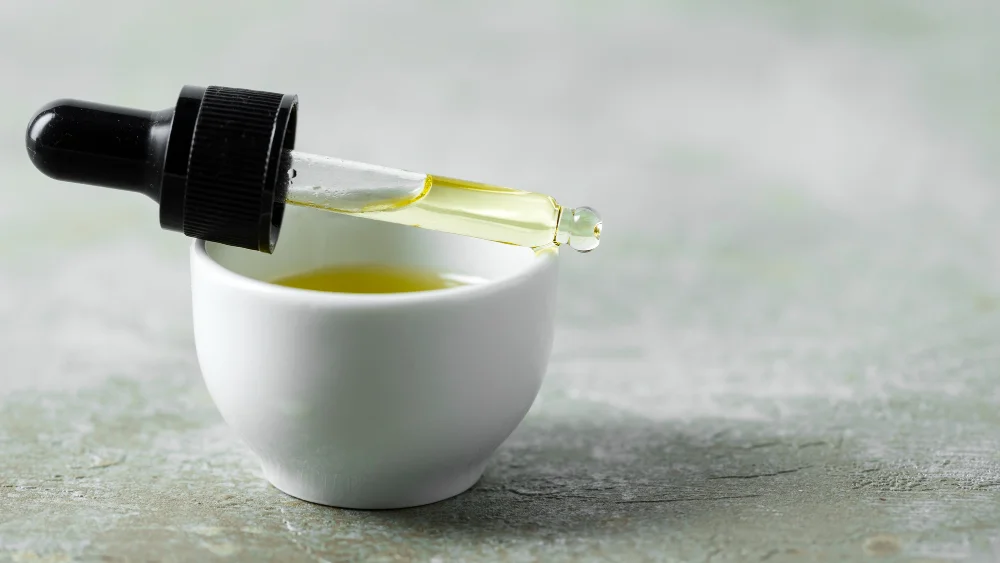
Eucalyptus oil is a type of essential oil that is derived from the leaves of the eucalyptus tree. It is a natural night cough remedy that can help relieve nocturnal cough. It has anti-inflammatory and antibacterial properties that can help reduce inflammation in the airways and loosen mucus, making it easier to breathe and reducing coughing. (11)
In Meta-Analysis study published in the journal of Integrative and Complementary Medicine found that eucalyptus oil helped to reduce coughing and improve lung function in patients with acute bronchitis.
How to use-
Here are some ways you can use eucalyptus oil as a home remedy for nocturnal Cough:
- Steam Inhalation: Boil a pot of water and remove it from heat. Add a few drops of eucalyptus oil to the water and inhale the steam for 5-10 minutes. Be careful not to get too close to the steam and keep your eyes closed to avoid irritation.
- Eucalyptus Oil Massage: Mix a few drops of eucalyptus oil with a carrier oil like coconut oil or olive oil. Massage the mixture onto your chest and throat before going to bed. The oil will absorb into your skin and help relieve congestion.
- Eucalyptus Oil Bath: Add a few drops of eucalyptus oil to a warm bath and soak in the water for 15-20 minutes before going to bed. The oil will help relieve congestion and reduce coughing.
Note: It is important to note that eucalyptus oil can be toxic if ingested or applied in large amounts, and it should not be used in children under the age of 2 or by pregnant or breastfeeding women without consulting a healthcare professional.
6. Turmeric milk for Nighttime cough remedies
Drinking turmeric milk is an excellent remedy for coughing while sleeping at night. Turmeric milk, also known as golden milk, is a traditional home remedy that can help relieve cough at night.
Turmeric contains curcumin, which has anti-inflammatory properties that can help reduce inflammation in the airways and relieve coughing. Milk contains tryptophan, an amino acid that can help you relax and sleep better. (12)
The Researcher found that turmeric was effective in reducing cough severity and improving quality of life in patients with chronic cough.
How to use-
Here’s how you can make turmeric milk at home:
Ingredients:
- 1 cup of milk
- 1/2 teaspoon of turmeric powder
- 1 teaspoon of honey (optional)
Instructions:
- Pour the milk into a saucepan and heat it on medium-low heat.
- Add the turmeric powder to the milk and stir well.
- Heat the milk for 5-7 minutes until it is hot but not boiling.
- If desired, add a teaspoon of honey to sweeten the milk.
- Pour the turmeric milk into a mug and drink it slowly before going to bed.
Turmeric milk is a safe and natural remedy, but if you are allergic to dairy or turmeric, you should avoid it.
7. Black pepper for cough suppressant
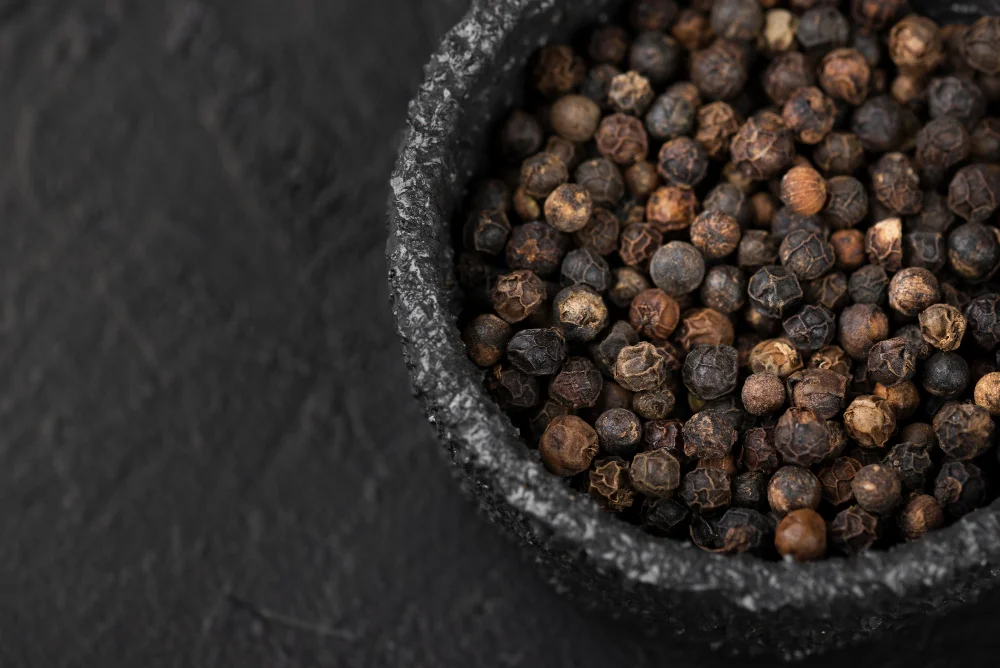
Black pepper is also known a nighttime cough relief. It contains an active compound called piperine, which has antimicrobial and anti-inflammatory properties that can help reduce coughing and loosen mucus in the airways. (13)
The researchers found that piperine has an inhibitory effect on a specific type of receptor in the lungs that is associated with coughing and other lung disease.
How to use-
Here’s how you can use black pepper as a home remedy for cough at night:
- Black Pepper Tea: Add 1 teaspoon of black pepper and 1 teaspoon of honey to a cup of hot water. Stir well and drink slowly before going to bed. The black pepper will help relieve congestion and the honey will soothe your throat.
- Black Pepper and Honey: Mix 1/4 teaspoon of black pepper and 1 tablespoon of honey in a small bowl. Swallow the mixture slowly to coat your throat and relieve coughing.
- Black Pepper and Turmeric Milk: Add 1/4 teaspoon of black pepper and 1/2 teaspoon of turmeric powder to a cup of warm milk. Stir well and drink slowly before going to bed. The black pepper and turmeric will help reduce inflammation and relieve coughing.
Remember that black pepper should be used in moderation, as consuming too much can cause stomach upset.
8. Chamomile tea for cough remedy
Chamomile tea is a natural home remedy that can help relieve cough. It contains anti-inflammatory and antioxidant compounds that can help soothe the throat, reduce inflammation in the airways, and promote relaxation. (14, 15)
In one study found that the dry flowers of chamomile was effective in reducing coughing and improving lung function in patients with acute bronchitis.
How to use-
Here’s how you can use chamomile tea as a home remedy for cough:
- Chamomile Tea: Steep a chamomile tea bag in a cup of hot water for 5-10 minutes. Drink the tea slowly before going to bed. The warm liquid can help soothe your throat and the chamomile can help reduce inflammation.
- Chamomile and Honey Tea: Add 1-2 teaspoons of honey and a chamomile tea bag to a cup of hot water. Let it steep for 5-10 minutes and then remove the tea bag. Stir well and drink slowly before going to bed. The honey can help soothe your throat and the chamomile can help reduce inflammation and promote relaxation.
Chamomile tea is generally safe, but if you are allergic to ragweed or other plants in the daisy family, you should avoid it.
9. Cinnamon for natural ways to stop cough at night
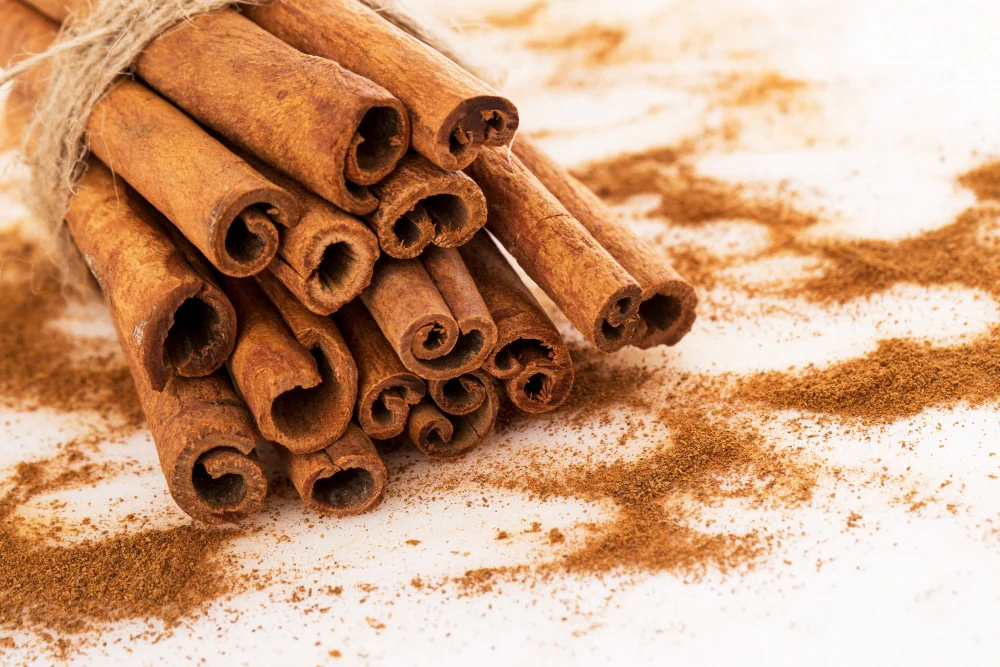
Yes, cinnamon can be use as natural remedies for coughing at night. It contains anti-inflammatory, antioxidant, and antimicrobial properties that can help reduce inflammation in the airways, fight off infection, and soothe the throat.(16)
Researcher found that cinnamon was effective in reducing the frequency and severity of coughing with upper respiratory tract infections.
How to use-
Here’s how you can use cinnamon as a home remedy for nocturnal Cough:
- Cinnamon Tea: Steep a cinnamon stick or 1 teaspoon of cinnamon powder in a cup of hot water for 10-15 minutes. Remove the cinnamon stick or strain the powder and drink the tea slowly before going to bed. The warm liquid can help soothe your throat and the cinnamon can help reduce inflammation.
- Cinnamon and Honey: Mix 1/4 teaspoon of cinnamon powder and 1 tablespoon of honey in a small bowl. Swallow the mixture slowly to coat your throat and relieve coughing. The honey can also help soothe your throat and has antibacterial properties.
- Cinnamon and Turmeric Milk: Add 1/4 teaspoon of cinnamon powder and 1/2 teaspoon of turmeric powder to a cup of warm milk. Stir well and drink slowly before going to bed. The cinnamon and turmeric will help reduce inflammation and relieve coughing.
Note: Remember that cinnamon should be used in moderation, as consuming too much can be harmful.
10. Garlic home remedy for cough
Garlic can also be use as a cough suppressants for nighttime. It has natural antimicrobial properties that make it a popular home remedy for coughs and colds. (17)
How to use-
Here are a few ways you can use garlic to help relieve your nighttime cough:
- Garlic tea: Crush 2-3 garlic cloves and steep them in hot water for 5-10 minutes. Add honey or lemon to taste, then drink the tea before bedtime.
- Garlic milk: Crush 2-3 garlic cloves and simmer them in a cup of milk for 5-10 minutes. Strain the mixture and drink the milk before bedtime.
- Garlic honey: Crush 2-3 garlic cloves and mix them with a tablespoon of honey. Eat the mixture before bedtime.
- Garlic steam: Boil a few cloves of garlic in water, then inhale the steam by covering your head with a towel and leaning over the pot. Be careful not to burn yourself.
Note: Garlic may interact with certain medications, so if you are taking any prescription medication,
11. Aloe vera for cough remedies for better sleep
Aloe vera juice is a powerhouse of micro-nutrients that help fight against free radical damage in the body, further giving a boost to immunity. It is a versatile plant that has been used for centuries to treat various ailments, including coughs. (18)
How to use-
Here are some home remedies using aloe vera for cough relief at night:
- Aloe vera juice: Take 2-3 tablespoons of fresh aloe vera juice and mix it with a teaspoon of honey. Consume this mixture before bedtime to soothe the throat and reduce coughing.
- Aloe vera and turmeric tea: Mix 1 tablespoon of aloe vera gel with 1/4 teaspoon of turmeric powder and a cup of warm water. Drink this tea before bedtime to alleviate coughing and boost immunity.
- Aloe vera and ginger tea: Grate a small piece of ginger and mix it with 1 tablespoon of aloe vera gel and a cup of boiling water. Let it steep for 5-10 minutes, then strain and drink before bedtime to ease coughing.
12. Apple cider vinegar for cough and sore throat
Apple cider vinegar (ACV) is a natural remedy that is believed to have many health benefits, including for cough and sore throat relief. Research shows they’re antimicrobial. These kill pathogens that cause infections leading to cough.
Here are a few ways to use apple cider vinegar for cough and sore throat remedies:
- Mix one to two tablespoons of apple cider vinegar with a glass of warm water. Drink this mixture once or twice a day.
- Gargle with a mixture of one tablespoon of apple cider vinegar and a teaspoon of salt in a glass of warm water to soothe a sore throat and ease coughing.
- Add one tablespoon of apple cider vinegar to a humidifier to help ease congestion and coughing.
- Mix one to two tablespoons of apple cider vinegar with a cup of warm water, a pinch of cayenne pepper, and a tablespoon of honey. Drink this mixture once a day.
Note: ACV is highly acidic and can cause irritation or damage to the digestive tract if used improperly. It’s best to dilute ACV before using it.
It is recommended to mix one to two tablespoons of apple cider vinegar with a glass of warm water.
Tips for Managing Cough at Night

Here are some tips to help alleviate a nighttime cough:
1. Elevate your head
Try sleeping with an extra pillow or propping up the head of your bed. This can help reduce postnasal drip, which can trigger coughing. (19)
2. Drink warm fluids
Sipping on warm fluids like herbal tea or warm water with honey can help soothe your throat and reduce coughing. (20)
3. Use a humidifier
Adding moisture to the air with a humidifier can help alleviate a dry cough, as dry air can irritate your throat. (21)
4. Avoid triggers
If you know what triggers your cough, try to avoid those triggers before bedtime. For example, if pet dander or dust triggers your cough, try to keep your bedroom free of these allergens. (22)
5. Try cough suppressants
Over-the-counter cough suppressants like dextromethorphan can help reduce coughing at night. However, be sure to talk to your doctor or pharmacist before taking any medication, especially if you have other health conditions or take other medications. (23)
6. Stay hydrated
Make sure to drink plenty of water throughout the day, as staying hydrated can help reduce coughing. (24)
7. Clean your are
Keep the bedroom clean and free of allergens like dust, pet dander, and pollen. (22)
8. Use nasal saline
Nasal saline can be used to alleviate a cough if it is caused by postnasal drip or congestion. When mucus or allergens accumulate in the nasal passages, they can trigger a cough as the body tries to clear them out. (26)
What foods to avoid when coughing?

Certain foods can trigger coughing at night or worsen an existing cough. Here are some foods to avoid cough at night . (27)
1. Spicy foods
If you have a cough, it is generally best to avoid spicy foods as they can irritate your throat and make your cough worse. Spicy foods can cause a burning sensation in your throat and make you cough even more, which can lead to further irritation and discomfort.
Some examples of spicy foods to avoid when you have a cough include: Hot sauce, Chili peppers, Curry dishes, Spicy soups, Wasabi, Salsa, Pepperoni, Pepper flakes.
2. White bread
White bread, pasta, baked food, chips and sugary foods should be avoided in cough. Instead of these, you can eat green leafy vegetables and other nutritious foods.
3. Fried foods
Fried foods should be avoided in cough. Fried foods contain a compound called acrolein, which irritates the throat.
4. Avoid tandoori items
You should not eat tandoori items like tandoori chicken, roast beef, toast to avoid cough.
5. Ice cream and cold drinks
Eating or drinking cold things can increase the production of mucus, which can make the cough worse.
6. Carbonated beverages
Carbonated beverages can cause acid reflux, which can irritate the throat and make coughing worse. Avoid soda, sparkling water, and other carbonated drinks.
Best nighttime cough medicine (OTC)
The type of medicine recommended to treat coughing at night will depend on the underlying cause of the cough. Here are some common medicine for cough at night that may be recommended: (28)
1. Cough suppressants
Cough suppressants can help to reduce the frequency and severity of coughing. They work by blocking the cough reflex in the brain. Common examples include dextromethorphan and codeine.
2. Expectorants
These medications can help to loosen mucus in the airways, making it easier to cough up. Common examples include guaifenesin.
3. Bronchodilators
This type of medicine can help to open up the airways, making it easier to breathe and reducing coughing. They are often used to treat asthma and COPD. Common examples include albuterol and salmeterol.
4. Corticosteroids
These medications can help to reduce inflammation in the airways, which can help to reduce coughing. They are often used to treat asthma and other respiratory conditions. Common examples include prednisone and fluticasone
It’s important to note that some over-the-counter cough and cold medications may not be safe or effective for treating coughing at night, especially in children. It’s important to talk to your doctor before taking any medications, especially if you have an underlying health condition or are taking other medications.
How do I know if my coughing is serious?
- High fever
- Chest pain
- Shortness of breath
- Wheezing
- Coughing up blood
- Fatigue
- Weight loss
- Night sweats
These symptoms could indicate a more serious condition that requires medical attention. Additionally, if your cough at night is interfering with your ability to sleep or affecting your quality of life, it’s also a good idea to see a doctor for an evaluation and possible treatment options.
Learn more- CBD Oil: A Comprehensive Guide of Its Benefits, Risks, and Uses
See more- Quick and Easy Ways to Eliminate Bitter Taste in Your Mouth
Conclusion
Home remedies can be an effective way to alleviate nighttime cough and help you get a better night’s sleep. Some of the most commonly recommended remedies include drinking warm liquids, using a humidifier or steam, avoiding irritants, elevating your head while sleeping, and trying natural cough suppressants like honey and ginger. However, it’s important to remember that the effectiveness of these remedies may vary depending on the underlying cause of the cough.
If your nighttime coughing persists or is accompanied by other symptoms, it’s important to consult a healthcare professional for proper diagnosis and treatment.
In conclusion, by utilizing these natural remedies, you can effectively stop cough at night and promote a better quality of life.
FAQ for Nighttime Cough
Q. How do I know if my cough is pneumonia?
Ans. It can be difficult to determine if your cough is caused by pneumonia or another respiratory illness without a proper medical evaluation. Symptoms of pneumonia include a high fever, chest pain, shortness of breath, and a productive cough that may produce yellow, green, or bloody mucus.
Q. How can I prevent coughing at night?
Ans. To prevent coughing at night, you can try sleeping with your head elevated, using a humidifier to add moisture to the air, and avoiding triggers like smoke and allergens. You can also try taking cough suppressants or expectorants as directed by your healthcare provider.
Q. Can certain foods or drinks make nighttime coughing worse?
Ans. Yes, certain foods and drinks can irritate the throat and make coughing worse, such as alcohol, caffeine, spicy or acidic foods, and dairy products.
Q. What over-the-counter remedies can help with nighttime coughing?
Ans. Over-the-counter remedies like cough suppressants, expectorants, and antihistamines can help with nighttime coughing. However, it’s important to talk to your healthcare provider before taking any medications, especially if you have underlying medical conditions or are taking other medications.
Q. Can hot liquids like tea or soup help with nighttime coughing?
Ans. Yes, hot liquids can help soothe the throat and reduce coughing. You can try drinking herbal tea or broth-based soups to help provide relief.
Disclaimer : The above information is given purely from educational point of view. This information should not be used for diagnosis or treatment of any disease without professional medical advice. Never ignore professional medical advice in seeking treatment. Apart from this, before adding or removing anything in your diet, please consult a qualified doctor or dietitian. If you think you may have a medical emergency, immediately call your doctor.
References
- Common colds: Protect yourself and others. (2021).
cdc.gov/features/rhinoviruses/ - Humidifiers and indoor allergies. (2020).
https://www.aaaai.org/tools-for-the-public/conditions-library/allergies/humidifiers-and-indoor-allergies - Humidifiers and indoor allergies. (2020).
aaaai.org/tools-for-the-public/conditions-library/allergies/humidifiers-and-indoor-allergies - Prevention. (2022).
cdc.gov/botulism/prevention.html - Smith S. (2022). 6 at-home remedies to ease your sore throat.
pennmedicine.org/updates/blogs/health-and-wellness/2018/february/sore-throat - Debra Rose Wilson: The Best Natural Cough Remedies
healthline.com/health/allergies/best-natural-cough-remedies - Sharma S, et al. (2022). Cough.
ncbi.nlm.nih.gov/books/NBK493221/
